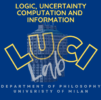Our teaching, at all levels, is designed and delivered in continuity with our research, in addition to giving you a unique opportunity to have a multidisciplinary learning experience, reflecting the broad applicability of the knowledge and competences you will acquire through the course. You will be able to take Logical Methods with students from the Quantitative Biology degree, and Probability Logic with students form the Philosophy, Politics and Public Affairs degree. At the undergraduate level, you may take our forthcoming Logics for Practical Reasoning and AI, which is designed for third-year students in the newly formed Bachelor in AI. The Master courses are delivered as part of the Reasoning Analysis and Modelling curriculum of the Laurea Magistrale in Scienze Filosofiche.
Courses
- Introduction to logic (M. D’Agostino)
- Logic I (G. Primiero)
- Logic for AI (G. Primiero)
- The epistemology of big data (H. Hosni)
- The information society: the epistemology of big data (H. Hosni)
- Logics for practical reasoning and Artificial Intelligence (G. Coraglia, E. Kubyshkina)
- Logical methods (M. D’Agostino)
- Logic of computation and information (G. Primiero)
- Probabilistic logic (H. Hosni)
- Advanced logic (H. Hosni)
- Text and argument mining (E. Corsi)
Detailed information about the course contents can be found here.
We also deliver a regular PhD intensive course on Topics in Logic, Uncertainty and Computation for the PhD degree in The Human Mind and Its Explanations: Language, Brain and Reasoning. The 2025 edition will take place in January and will focus on Reasoning under uncertainty.
Further teaching information and resources
We recommend students who wish to write about logic to learn LaTeX. Here is a template which Paolo Baldi developed for our students. It can be used for a master thesis in logic, and as a short guide to LaTeX. You can also find here and here two short tutorials about it.
